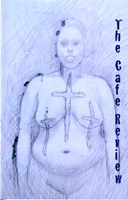Changes

by Harriet Sohmers Zwerling
Now that I cannot do it alone,
my tall son leads me
into the chilly waters of the bay
where I float above the jagged bottom
stroked by seaweed
rocked by ripples from the passing boats.
More than forty years ago
he lay in the saline waters of my womb
rocked by my rhythms
absorbed in becoming.
Now, he helps me out and seats me
on the sand.
“Look, Mom,” he says, “there’s a crab!”
He nudges it out of the water with my cane
and . . . surprise . . . there are two,
copulating crustaceans,
glued together,
accomplishing life, as we have done.
I Am Absent, But Deep In This Absence—after a line by Juana de Ibarbourou

by Leslie Ullman
a prickling like tiny, almost
downy cactus thorns that work
their way through leather gloves
sometimes settles at the periphery
of my thoughts when the person I love most
is troubled. Even here, two time zones
away, astonished to find one at last,
I pick up a heart – shaped stone
carved, polished, laced with salt
and left at my feet by Atlantic tides
and my fingers can feel, along
its mirrored halves, the spines of trouble
against his fine heart. The little inroads
it makes. The undertow beneath his jokes
and gentle hands.
My absence leaves
the shape of me when I’m gone.
The person I love most loves my life
as it is. He takes the ebb
and flow of trouble
quietly as the fields take
the weather, as the sky takes clouds,
as the earth took the solitude
of its birth into gasses and rock.
The heart – shaped stone warms
in my palm, and now at my feet I can see
scores of hearts, their different shades
and symmetries, heart – shapes repeating themselves
all along the beach. The prickling etches spidery
cracks through my hands, as though someone
has thrown stones against them. I fill
my pockets with heart stones and carry,
though he would never ask me to,
his heart in my hands
as the earth accepts my footprints
and relinquishes them to tides.
Precarious

by Leslie Ullman
Balance in moving parts: the rider
spurring her horse on a straightaway
before she remembers to
reach down and tighten the girth
or the skier dislodging new snow in a chute
too steep for a safe fall, skier and snow
riding the crest of themselves as avalanche;
the vertigo new lovers ignore
at the heights of discovering, their hands
free over one another’s eyes, cheeks, their
histories waiting like unopened parcels
below — they don’t know they
don’t know what’s inside — and
then, if they survive the heat,
the anvil, the long cooling into a calm
devotion, a durable rhythm of speech
and silence, a thin sheen melts
and freezes imperceptibly (and they
know this) on a mountain road
one of them travels every day;
resilience gone slowly, undetected
in the heart, that reliable muscle,
or the hip or knee or tunnels of softening bone —
one moment one holds one’s own in all
the threatened air the traffic and people in a hurry
are pushing through, and then
one doesn’t, or won’t again
without having to consider the weight
and isolation of each limb;
imbalance in moving
parts; separation;
prelude.
This Scar—After a line by Fernando Lisboa

by Leslie Ullman
Lord, forgive me if I don’t look for you
beneath vaulted ceilings built by
canonical money and generations of peasants
sweating against blocks of stone. Forgive me
that I shiver inside the stained glass
extravagance of Notre Dame;
that my neck aches beneath the Duomo’s
distant mosaics, while others bow over their
clasped hands as though You
resided there, Your providence housed
in ever smaller enclosures, each supplicant
the reverse end of a telescope.
Forgive me that I can’t forget the money
that has changed and changed hands
in Your name. The darkened
centuries. The multitudes
lashed, mowed down, locked away
from natural light . . .
Forgive me if the light rising from
the beads a shaman once pressed to resin
inside a gourd to resurrect the spirit – world of
jaguar, iguana, scorpion, and snake
makes before me an altar of cerise and cobalt
and lifts me in a way I can’t explain.
Forgive me that I lose track of time when I behold
the space within curves of driftwood shaped
by the meeting of two rivers; that dancing
leaves me cleansed in sweat and eased of
travail; that I am consoled less by the thought
of heaven than I am by the dog who rises silently
to walk beside me when I leave the dance hall.


